20 Section 2-5
2.5: Accusative Prepositions
You learned in a previous section that the accusative case is used for direct objects.
Der Professor kauft einen Computer.
(direct object)
To sum it up, we add an extra –en to the ending of ein-words, kein, and possessive adjectives that are masculine. The definite article der becomes den.
The accusative case will also be used after the following prepositions:
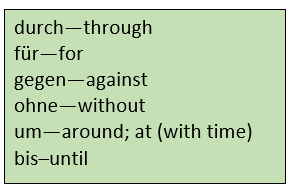
Whenever you see one of these, use the accusative case on the noun or pronoun that comes immediately after it.
Beispiele:
- Unser Neffe geht durch die Stadt. (through the city)
- Die Geschwister kaufen Gemüse für ihre Eltern. (for their parents)
- Die Schwester spielt gegen ihren Bruder. (against her brother)
- Ich esse lieber Pommes frites ohne Mayo. (without mayonnaise)
- Der Mann fährt um die Ecke. (around the corner)
- Tschüss! Bis Montag! (until Monday)
Video. Watch Anja’s video to see her reteaching accusative prepositions with more examples.
Ex. A: Was passiert? Fill in the blank with an accusative preposition to complete the sentence.
- Das Auto stößt _______ ein Auto.

- Das Auto fährt ________ die Ecke.
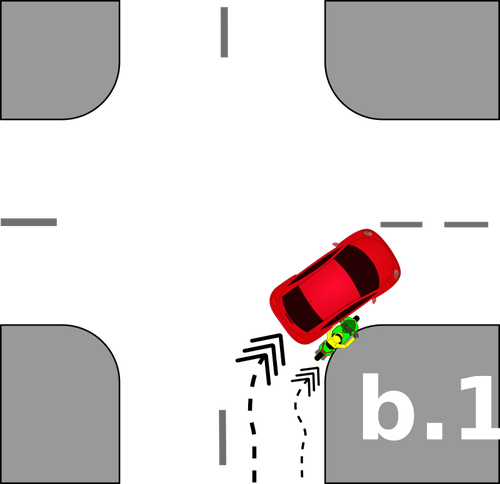
- Das Auto fährt ________ die Straßenlaterne.
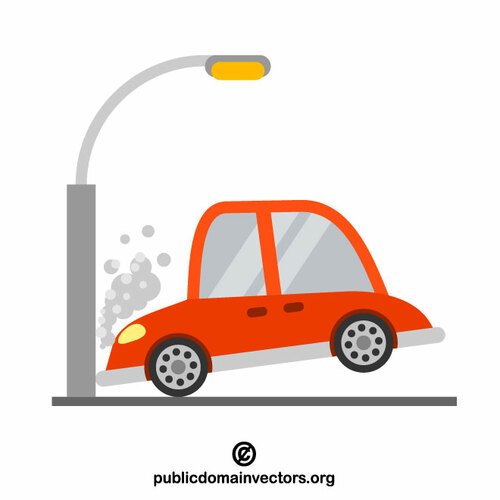
- Das Kind hat ein Geschenk ________ seinen Vater.

- „Ich fahre nach New York! _______ Sonntag!“

- Wir sehen ein Mädchen _______ Geld.
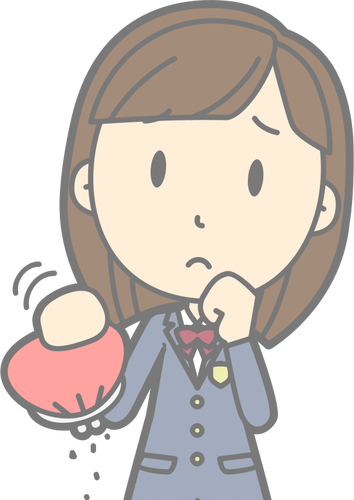
- Unser Bus fährt ______ fünf nach neun los.

- Der Mann geht _______ die Tür.

Ex. B: Durch. Beschreiben Sie Ihre Reise! Using a map, tell which cities you will drive through to get to your destination.
Beispiel: Wir sind in Italien und reisen nach Frankreich.
→Wir fahren durch Italien, die Schweiz, und Frankreich.
(We’re driving through Italy, Switzerland, and France.)
- Wir sind in Portugal und reisen nach Belgien.
- Wir sind in Finnland und reisen nach Litauen.
- Wir sind in Ungarn und reisen nach Polen.
- Wir sind in Italien und reisen nach Tschechien.
- Wir sind in Dänemark und reisen nach Österreich.
- Wir sind in Spanien und reisen nach Polen.
- *Wir sind in Deutschland und reisen nach England.
Ex. C: Für wen macht sie das? For whom is Jasmin doing the following things? Don’t forget to put the word after für in the accusative case.

Beispiel: Für wen kocht Jasmin? (grandfather)
→Sie kocht für ihren Großvater.
(She is cooking for her grandfather).
- Für wen kauft Jasmin einen Pulli? (cousin/m.)
- Für wen schreibt Jasmin eine E-Mail? (siblings)
- Für wen macht Jasmin einen Obstsalat? (uncle)
- Für wen sucht Jasmin ein Geschenk? (niece)
- Für wen zeichnet Jasmin ein Bild? (brother-in-law)
- Für wen spricht Jasmin Türkisch? (grandmother)
- Für wen trägt Jasmin eine Jacke? (mother)
Ex. D: Wer spielt gegen wen? Who is playing against whom? Answer the questions with the cues provided. Don’t forget to put the word after gegen in the accusative case.
Beispiel: Tanja/ihr Vater
→Tanja spielt gegen ihren Vater.
- Matthias/seine Tante
- Sophia/ihr Enkel
- Jana/ihr Onkel
- das Kind/sein Hund
- die Enkelin/ihre Großeltern
- mein Neffe/seine Schwägerin
- dein Bruder/seine Frau
- unsere Mutter/unser Vater
![]()
Ex. E: Ohne! Using vocabulary for articles of clothing, describe what you will be traveling without; then say what you will take with you instead. Don’t forget to put the word after ohne in the accusative case, as well as any direct objects. They are underlined in the example below.
Beispiel: Wir reisen im Sommer nach Florida.
→Ich reise ohne meine Jacke; ich nehme einen Badeanzug mit.
- Wir reisen im Winter nach Minnesota.
- Wir reisen im Frühling nach Florida.
- Wir reisen im Herbst nach Vermont.
- Wir reisen im Sommer nach Alaska.
- Wir reisen im Winter nach Hawaii.
- Wir reisen im Frühling nach Mexiko.
- Wir reisen im Herbst nach Deutschland.

Ex. F: Um. Wir helfen Touristen! Using the words in the box above, describe that the following places are located just around the word in parenthesis. Don’t forget to put the word after um in the accusative.![]()
Beispiel: A: Wo finde ich das Kino? (die Ecke)
B: Gehen Sie um die Ecke.
- Wo finde ich den See? (der Baum)
- Wo finde ich das Dorf? (die Stadt)
- Wo finde ich den Supermarkt? (die Post)
- Wo finde ich die Bank? (die Bibliothek)
- Wo finde ich die Post? (der Supermarkt)
- Wo finde ich die Universität? (die Stadt)
Ex. G: Bis. Wohin fährt Thomas? Using the schedule below, describe how long Thomas will stay at each location.
|
Montag |
Dienstag |
Mittwoch |
Donnerstag |
Freitag |
Samstag |
Sonntag |
|
England |
Engl. |
Engl. |
Dänemark |
Dän. |
Dän. |
Dän. |
|
Dän. |
Belgien |
Belg. |
Belg. |
Belg. |
Irland |
Irl. |
|
Irl. |
Irl. |
Finnland |
Finn. |
Finn. |
Spanien |
Span. |
Beispiel: England
→Thomas fährt am Montag nach England. Er bleibt bis Mittwoch.
Ex. H: Welches Wort passt? 
- Wir reisen nach Tennessee und fahren durch ______ Berge. a. die b. den c. der
2. Die Tochter reist ohne _______ Vater nach Italien. a. ihre b. ihren c. ihr
3. Die Touristen fahren um _______ Stadt. a. die b. den c. das
4. Viele Kinder arbeiten für ______ Eltern. a. ihre b. ihren c. ihr
5. Es gibt nicht viele Tage ______ Weihnachten. a. um b. bis c. gegen
6. Käse ist lecker! Ich kaufe nie Pizza ______ Käse. a. durch b. für c. ohne
7. Der Mann hat ein Geschenk (gift) ______ die Frau. a. um b. für c. gegen
8. Viele Studenten machen Eine Reise ______ die Welt. a. um b. ohne c. bis
9. Viele Studenten reisen ______ ihre Eltern. a. bis b. um c. ohne
Ex. I: Der Akkusativ. Fill in the blank with the correct form of the noun after each preposition.
Beispiel: Wir haben eine Pizza für __________. (our uncle)
→Wir haben eine Pizza für unseren Onkel.
- Maike fährt ohne _________ nach Italien. (her brother)
- Samuel reist mit Freunden durch ________. (the city)
- Wir spazieren gern um _________. (the university)
- Die Studenten spielen Tennis gegen __________. (the professors)
- Die Oma kauft einen Roman für ________. (her grandson)
- Meine Geschwister reisen um __________. (the world)
Listen to Johannes Oerding’s song, Wenn du gehst, 2019, to hear some accusative prepositions.
Text: https://www.songtexte.com/songtext/johannes-oerding/wenn-du-gehst-g5b8d67e4.html
Listen to Silbermond’s song Gegen (2012) to hear several examples of the accusative preposition “gegen.”
Text: https://genius.com/Silbermond-gegen-lyrics
Contractions with accusative prepositions:
Languages often form contractions, which is a short form of two or more words combined. We do this in English frequently.
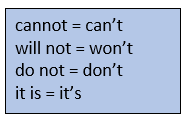
These words can be used either in their long form or their contracted form. Although they are normally used as contractions in English, often we use the long form for emphasis.
I will not eat broccoli! vs I won’t eat broccoli.
Similarly, in German there are three of the accusative prepositions that form contractions. Just like in English, they can be used without the contracted form to show emphasis, but often they are used as contractions.
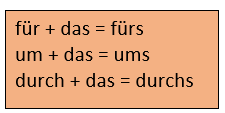
Beispiele:
- Wir laufen ums Hotel. (um das Hotel = ums Hotel)
- Sie gehen durchs Dorf. (durch das Dorf = durchs Dorf)
- Du kaufst ein Eis fürs Kind. (für das Kind = fürs Kind)
- Ich tanze ums Taxi. (um das Taxi = ums Taxi)

Ex. J: Gibt es eine Kurzform? Do the following prepositional phrases have a short form? If so, use a contraction to restate them. Bonus: Make an entire sentence with the phrase, using a stem-changing verb!
- durch das Dorf
- um die Universität
- für mein Kind
- um das Kino
- gegen die Wand
- ohne das Kind
- für das Kind
- durch das Zimmer
EXTRA PRACTICE with accusative pronouns:
Go to Germanzone.org’s site to practice accusative pronouns and have your answers checked automatically.
- https://www.germanzone.org/accusative-case-personal-pronouns-1/.
- https://www.germanzone.org/accusative-case-personal-pronouns-2/.
Ex. K: Artikel. Lesen Sie den Artikel und beantworten Sie die Fragen.
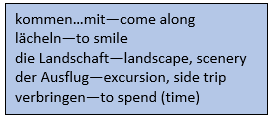
Dillon Falkenberg reist nach Europa. Seine Cousine Tess und sein Vater, Herr Falkenberg, kommen mit.
„Wir starten in Frankreich. Dann fahren wir durch Belgien, Luxemburg, Deutschland, und die Schweiz,“ sagt Herr Falkenberg.
Tess lächelt nicht. „Nein, wir fahren um Luxemburg,“ antwortet sie. „Ich fahre lieber nicht durch Luxemburg.“
„Aber Tess! Was hast du gegen Luxemburg?“ fragt Dillon. „Die Luxemburger sind so freundlich, und die Landschaft ist sehr schön!“
„Wir haben nicht genug Zeit. Wir bleiben nur zwei Wochen in Europa, also bis August,“ sagt Tess.
Dillon ist nicht zufrieden. Ohne Luxemburg ist seine Europareise nicht ideal.
„Moment mal!“ sagt Herr Falkenberg. „Es gibt genug Zeit für einen Ausflug nach Luxemburg. Wir fahren kurz mal dahin, essen zu Mittag im Restaurant und fahren weiter nach Deutschland.“
Dillon und Tess finden seine Idee sehr praktisch. Die Familie verbringt eine Stunde im Restaurant in Luxemburg. Dann fährt sie nach Deutschland.
- Wer reist nach Europa?
- Wo beginnt die Reise?
- Was hat Tess gegen eine Reise durch Luxemburg?
- Was für eine Idee hat Herr Falkenberg?
- Wie lange bleibt die Familie in Luxemburg?
Ex. L: Nicos Weg. Episode 16: Zahlen bitte! Watch episode 16 of Nicos Weg. Then do the online activities.

https://learngerman.dw.com/en/zahlen-bitte-/l-37280348.
EXTRA PRACTICE with accusative prepositions. Go to Germanzone.org’s site to practice as much as you like with all your answers graded.
- Fill in the blank with the correct preposition: https://www.germanzone.org/accusative-prepositions-2/.
- This one is more advanced. Look up the words if you’re not sure what some of them are. https://www.germanzone.org/accusative-prepositions-1/.

